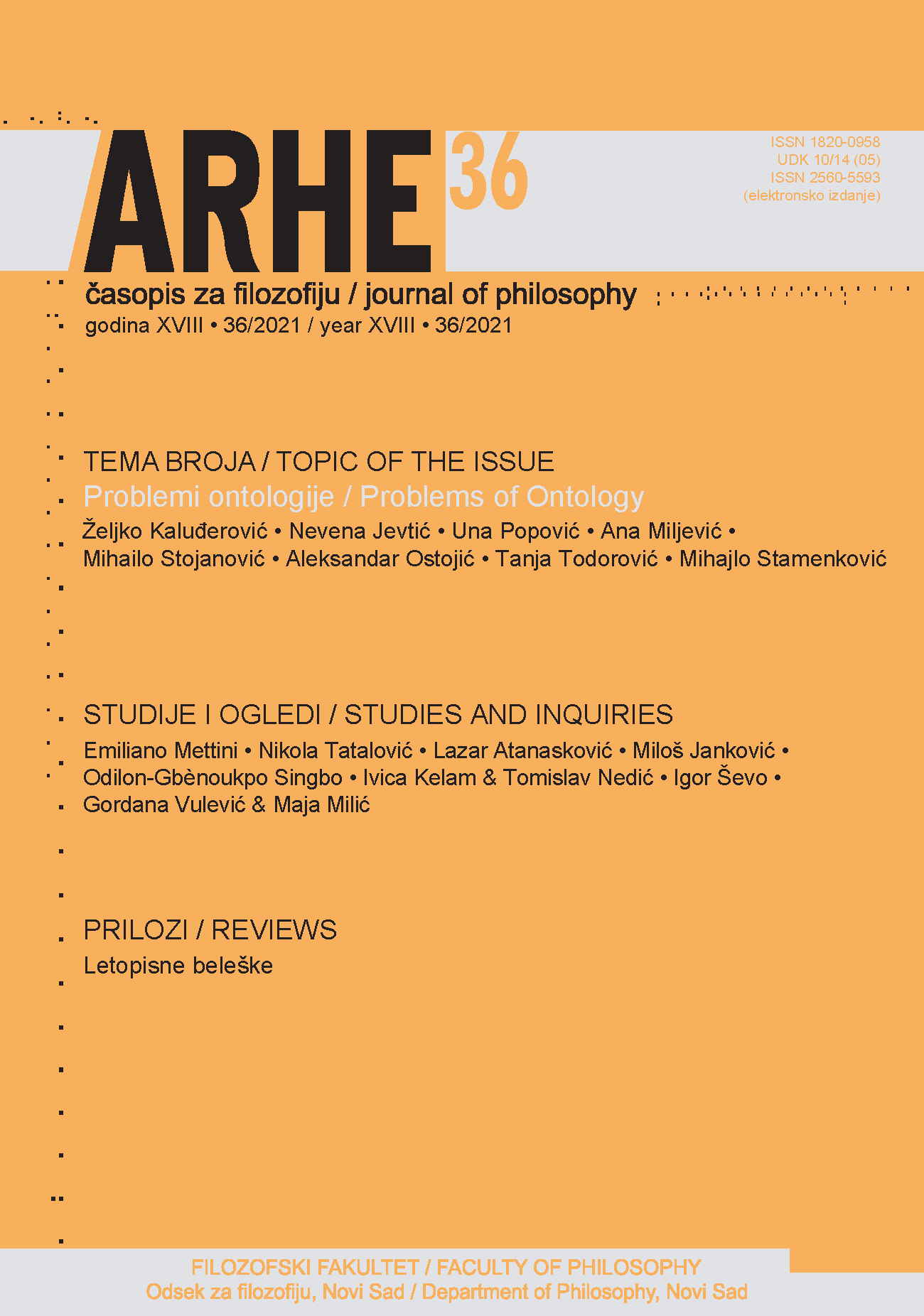RASTJELOVLJENJE LJUDSKOGA. O (ID)ENTITETU TRANSHUMANISTIČKOG SUBJEKTA
Glavni sadržaj članka
Apstrakt
Transhumanizam kao filozofski pravac pomoću znanstveno-tehničkih dostignuća promiče, među ostalim, produžavanje ljudskog života kroz oslobođenje manjkavosti kojima je ljudsko tijelo obilježeno. On znatno utječe na poimanje ljudske naravi stvarajući okvire za paradigmatsku promjenu pogleda na tijelo. Tijelo prolazi kroz konceptualno-teorijske i tehničko-praktičke transbiomorfoze s ciljem ispunjenja svih potencijala subjekta u duhu morfološke slobode. Na taj je način otvoren put k dolasku ekstropijskog subjekta koji bi napredovao po dinamici neprekinutog razvoja. Želja za nadmoći nad prirodnim datostima proteže se kroz kontrolu tijela podvrgnutog raznim hibridnim praksama. Ovdje transhumanističko self-made-man načelo pokazuje instrumentalni i idealizirajući odnos subjekta prema vlastitom tijelu. Takvo načelo traži temeljito promišljanje o ljudskome kako bi se raskrinkali identitetski temelji idealnog i savršenog subjekta koji se želi pokazati kroz novo i poboljšano tijelo. Transhumanistička potraga za novim i savršenim bićem postaje izazov filozofsko-teološkom poimanju ljudskog tijela.
Detalji članka
Reference
Andrieu, B., „Entretien avec Jean-Luc Nancy“, Corps 9 (1/2011.), str. 49–55. DOI: https://doi.org/10.3917/corp1.009.0047
Andrieu, B., „Se ʻtranscorporerʼ. Vers une autotransformation de l'humain?“, La pensée de midi, 30 (2010.), str. 34–41. DOI: https://doi.org/10.3917/lpm.030.0034
Arendt, H., The Human Condition, The university of Chicago Press, Chicago & London 1998.
Bacon, F., Novi organon ili istinske upute za razjašnjavanje prirode, (preveo Viktor D. Sonnenfeld), Naprijed, Zagreb 1986.
Baillie, H. W., Casey, T. K. (ur.), Is Human Nature Obsolete? Genetics, Bioengineering, and the Future of the Human Condition, The MIT Press, Cambridge 2004. DOI: https://doi.org/10.7551/mitpress/3977.001.0001
Baudrillard, J., Simulacija i zbilja, Jesenski i Turk, Zagreb 2001.
Bour, S., „Le corps augmenté, nouveau lieu d'expression de soi. Les conceptions transhumanistes du corps humain“, u: Calais, V., Deprez, S. (ur.), Le corps des transhumains, Erès, Toulouse 2019., str. 31–56. DOI: https://doi.org/10.3917/eres.calai.2019.01.0031
Crnčević, A., Šaško, I., Liturgija i tijelo. Prilozi za liturgijsku antropologiju, HILP, Zagreb 2020.
Deprez, S., „De la honte du corps au désir d'être unique“, u: Calais, V., Deprez S., Le corps des transhumains, Erès, Toulouse 2019., str. 57–85. DOI: https://doi.org/10.3917/eres.calai.2019.01.0057
Dreyfus, H. L., What Computers Still Can't Do. A Critique of Artificial Reason, MIT Press, Cambridge – London 1999.
Esfandiary, F. M., Telespheres, Popular Library, New York 1977.
Gibson, W., Neuromancer, Berkley, New York 2004.
Grbac, J., Etičke dvojbe hrvatskog društva. O važnosti odgoja za moralne vrijednosti, Kršćanska sadašnjost, Zagreb 2009.
Günther, A., L’Obsolescence de l’homme: Sur l’âme à l’époque de la deuxième révolution industrielle, Ivrea, Paris 2002.
Haraway, D., Simians, Cyborgs, and Women. The Reinvention of Nature, Routledge, New York 1991.
Hughes, J., „Democratic Transhumanism 2.0“,
http://www.changesurfer.com/Acad/DemocraticTranshumanism.htm, datum pristupa 14. 11. 2020.
International Theological Commission, Communion and Stewardship. Human Persons Created in the Image of God, http://www.vatican.va/roman_curia/congregations/cfaith/cti_documents/rc_con_cfaith_doc_20040723_communion-stewardship_en.html, datum pristupa 10. 3. 2020.
Larchet, J.-C., Malade des nouveaux médias, Cerf, Paris 2016.
Leary, T., Chaos and Cyber Culture, Berkeley, California 1994.
Lestel, D., „Des enjeux de la tentation posthumaine“, u: Munier, B. (ur.), Technocorps. La sociologie du corps à l'épreuve des nouvelles technologies, François Bourin, Paris 2013., str. 145–170.
Max, M., „The Philosophy of Transhumanism“, u: More, M., Vita-More, N., (ur.), The Transhumanist Reader. Classical and Contemporary Essays on the Science, Technology, and Philosophy of the Human Future, Wiley-Blackwell, Oxford 2013., str. 3–17. DOI: https://doi.org/10.1002/9781118555927.ch1
Moravec, H., Mind Children. The Future of Robot and Human Intelligence, Harvard University Press, Cambridge – London 1988.
More, M., „From Human to Transhuman to Posthuman“, Extropy 8 (1991/92.), 42–43.
More, M., „Technological self-transformation. Expanding personal extropy“, Extropy, 4 (2/1993.), 15–24.
More, M., „The Extropian Principles“, https://mrob.com/pub/religion/extro_prin.html, datum pristupa 22. 11. 2019.
More, M., „The Overhuman in the Transhuman“, Journal of Evolution and Technology, 21 (1/2010.), str. 1–4.
Morse, M., „What Do Cyborgs Eat? Oral Logic in an Information Society“, u: Gretchen Bender, Timothy Druckrey (ur.), Culture on the Brink. Ideologies of Technology, The New Press, New York 1998., str. 157–189.
Pastoralna konstitucija Gaudium et spes o Crkvi u suvremenom svijetu, u: Drugi vatikanski koncil, Dokumenti, Kršćanska sadašnjost, Zagreb 2008.
Piccinini, G., „The Computational Theory of Cognition“, u: Müller, V. C. (ur.), Fundamental Issues of Artificial Intelligence, Springer, Switzerland 2016., 203–221. DOI: https://doi.org/10.1007/978-3-319-26485-1_13
Pitts, V. L., In The Flesh. The Cultural Politics of Body Modification, Palgrave Macmillan, New York 2003. DOI: https://doi.org/10.1057/9781403979438
Rifkin, J., The Biotech Century. Harnessing the Gene and Remaking the World, Penguin Putnam, New York 1999.
Singbo, O.-G., „Postsmrtno stanje: metafizičko-eshatološke ambicije transhumanizma“, Filozofska istraživanja, 40 (2/2020.), str. 251–267. DOI: https://doi.org/10.21464/fi40203
Singbo, O.-G., Teološko-bioetičko vrjednovanje transhumanističke antropologije, Kršćanska sadašnjost, Hrvatsko katoličko sveučilište, Zagreb 2021.
Stock, G., Redesigning Humans. Choosing our genes, changing our future, Houghton Mifflin Company, Boston – New York 2003.
Vita-More, N., „Extropic Art Manifesto of Transhumanist Arts“, http://www.arthistoryarchive.com/arthistory/contemporary/Extropic-Art-Manifesto.html, datum pristupa 10. 11. 2020.
Warwick, K., I, Cyborg, University of Illinois Press, Illinois 2004.
Weizenbaum, J., „On the Impact of the Computer on Society. How does one insult a machine?“, Science 176 (4035/1972.), str. 609–614. DOI: https://doi.org/10.1126/science.176.4035.609
Web-stranice:
https://metabody.eu/jaime-del-val/, datum pristupa 13. 11. 2020.
https://www.orlan.eu/, datum pristupa 14. 9. 2020.
